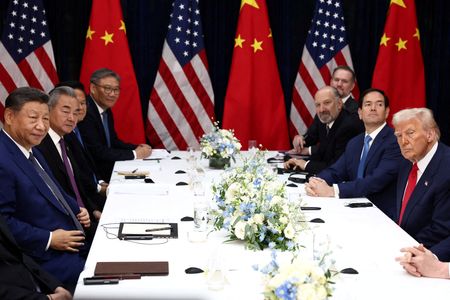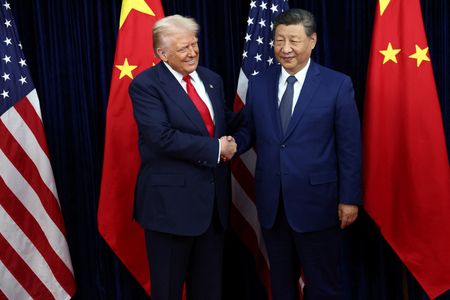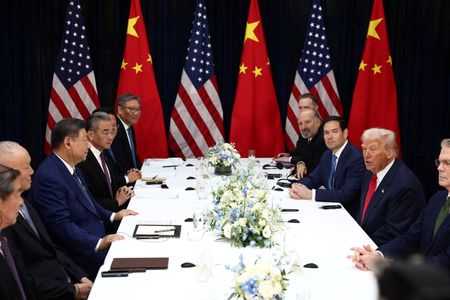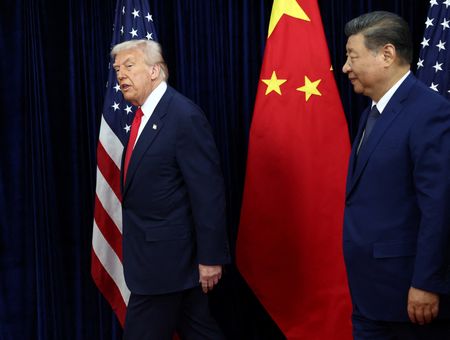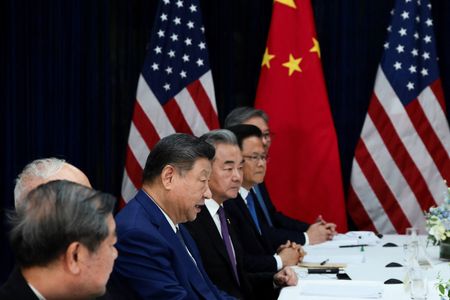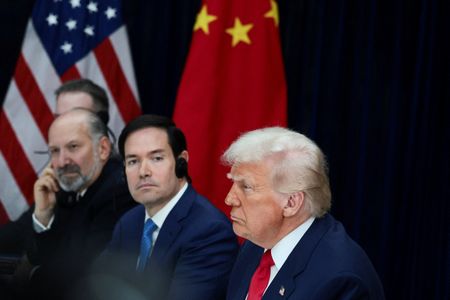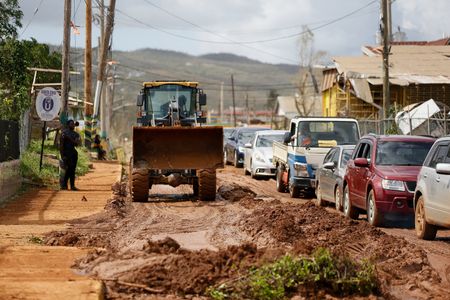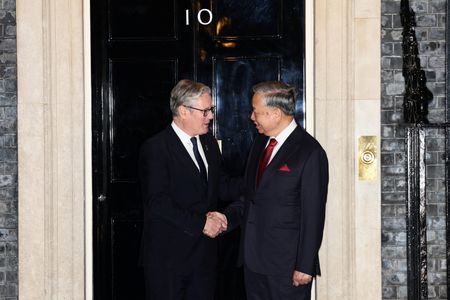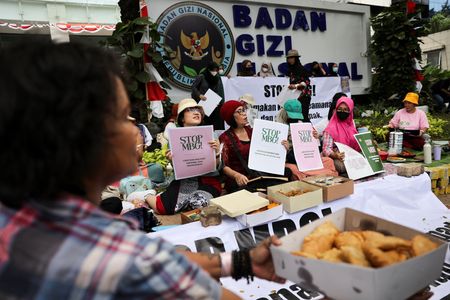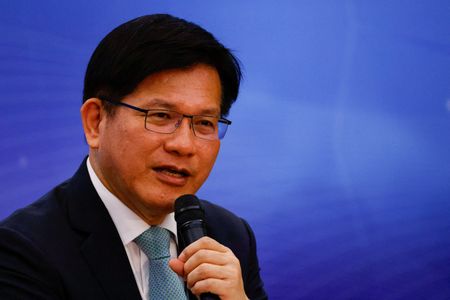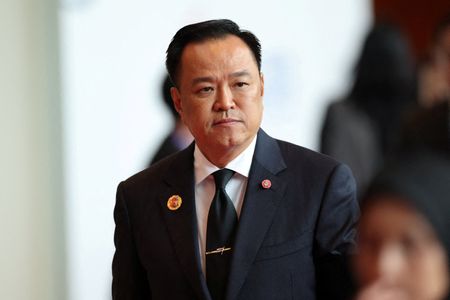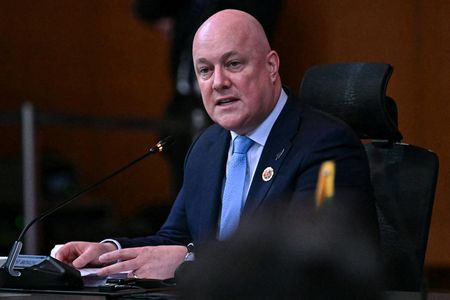By Trevor Hunnicutt
BUSAN, South Korea (Reuters) -U.S. President Donald Trump kicked off a meeting with China’s leader Xi Jinping at a South Korean air base on Thursday optimistic about striking a trade-war truce between the world’s two largest economies.
The talks in the southern port city of Busan, their first face-to-face meeting since 2019, mark the finale of Trump’s whirlwind trip around Asia in which he has touted several trade breakthroughs with South Korea, Japan and Southeast Asian nations.
“We are going to have a very successful meeting, I have no doubt. But he is a very tough negotiator,” Trump said as he shook hands with Xi, who showed little emotion as Trump told reporters the pair might sign a trade deal on Thursday.
As they sat down with their delegations to begin talks, Xi told Trump via a translator it was normal for the two leading economies of the world to have frictions now and then.
A few days ago, trade negotiators for both countries reached a “fundamental consensus on addressing each other’s primary concerns”, Xi said. “I am willing to continue working with President Trump to lay a solid foundation for China-U.S. relations,” he added.
China’s yuan currency rose to a near one-year high against the dollar as investors hoped for an easing of trade tensions that have rocked global business. World stock markets from Wall Street to Tokyo have hit record highs in recent days.
Trump has repeatedly talked up the prospect of reaching agreement in his meeting with Xi, taking place on the sidelines of the Asia-Pacific Economic Cooperation (APEC) summit, since negotiators from both sides appeared to reach an understanding in Kuala Lumpur on Sunday.
But with both countries increasingly willing to play hardball over areas of economic and geopolitical competition, many questions remain about how long any trade detente may last.
The trade war reignited this month after Beijing proposed dramatically expanding curbs on exports of rare-earth minerals vital for high-tech applications, a sector China dominates.
Trump vowed to retaliate with additional 100% tariffs on Chinese exports, and with other steps including potential curbs on exports to China made with U.S. software – moves that could have upended the global economy.
“THE G2 WILL BE CONVENING SHORTLY,” Trump posted on Truth Social shortly before landing in Busan.
In a separate post, he said the U.S. would step-up testing of nuclear weapons immediately, noting China’s growing arsenal. Trump declined to respond to a reporter’s question on the post at Thursday’s meeting.
U.S. EXPECTS BEIJING TO DELAY RARE EARTH CONTROLS
After a weekend scramble between top trade negotiators, U.S. Treasury Secretary Scott Bessent said he expected Beijing to delay the rare earth controls for a year and revive purchases of U.S. soybeans critical to American farmers, as part of a “substantial framework” to be agreed by the leaders.
Ahead of the summit, China bought its first cargoes of U.S. soybeans in several months, Reuters reported exclusively on Wednesday.
The White House has signaled it hopes the summit will be the first of several between Trump and Xi in the coming year, including possible leader visits to each country, indicating a protracted negotiation process.
But Trump wants some quick progress, in talks being closely watched by businesses worldwide.
Trump said on Wednesday he expects to reduce U.S. tariffs on Chinese goods in exchange for Beijing’s commitment to curb the flow of precursor chemicals to make fentanyl, a deadly synthetic opioid that is the leading cause of American overdose deaths.
Trump has also said he might sign a final deal with Xi on TikTok, the social media app that faces a U.S. ban unless its Chinese owners divest its U.S. operations.
PRIOR DEALS ON TARIFFS AND RARE EARTHS DUE TO EXPIRE
Previous deals, which brought down retaliatory tariffs sharply to about 55% on the U.S. side and 10% on the Chinese side and restarted the flow of rare earth magnets from China, are due to expire on November 10.
Bessent said China had agreed to help curb the flow of fentanyl precursors, but did not say whether the U.S. had made any concessions in return.
Beijing has sought the lifting of 20% tariffs over fentanyl, an easing of export controls on sensitive U.S. technology, and a rollback of new U.S. port fees on Chinese vessels aimed at combating China’s global dominance in shipbuilding, ocean freight and logistics.
Trump’s meeting with Xi comes at the end of a five-day trip to Asia in which he signed pacts with Japan and Southeast Asian nations on rare earths, seeking to blunt China’s stranglehold on minerals used in everything from cars to fighter jets.
TENSIONS OVER TAIWAN
Regional strategic tensions, particularly over Beijing-claimed Taiwan, a U.S. partner and high-tech powerhouse, are an ominous backdrop to the summit.
On Sunday, Chinese state media said Chinese H-6K bombers recently flew near Taiwan to practise “confrontation drills.”
U.S. Secretary of State Marco Rubio said Taiwan should not be concerned about the U.S.-China talks, despite some experts expressing fears that Trump might offer concessions over the island. Washington is required under U.S. law to provide Taiwan with the means to defend itself.
(Reporting by Trevor Hunnicutt in Busan, Michael Martina, David Brunnstrom, David Lawder and Daphne Psaledakis in Washington; Writing by John Geddie; Editing by Edmund Klamann and Lincoln Feast)

